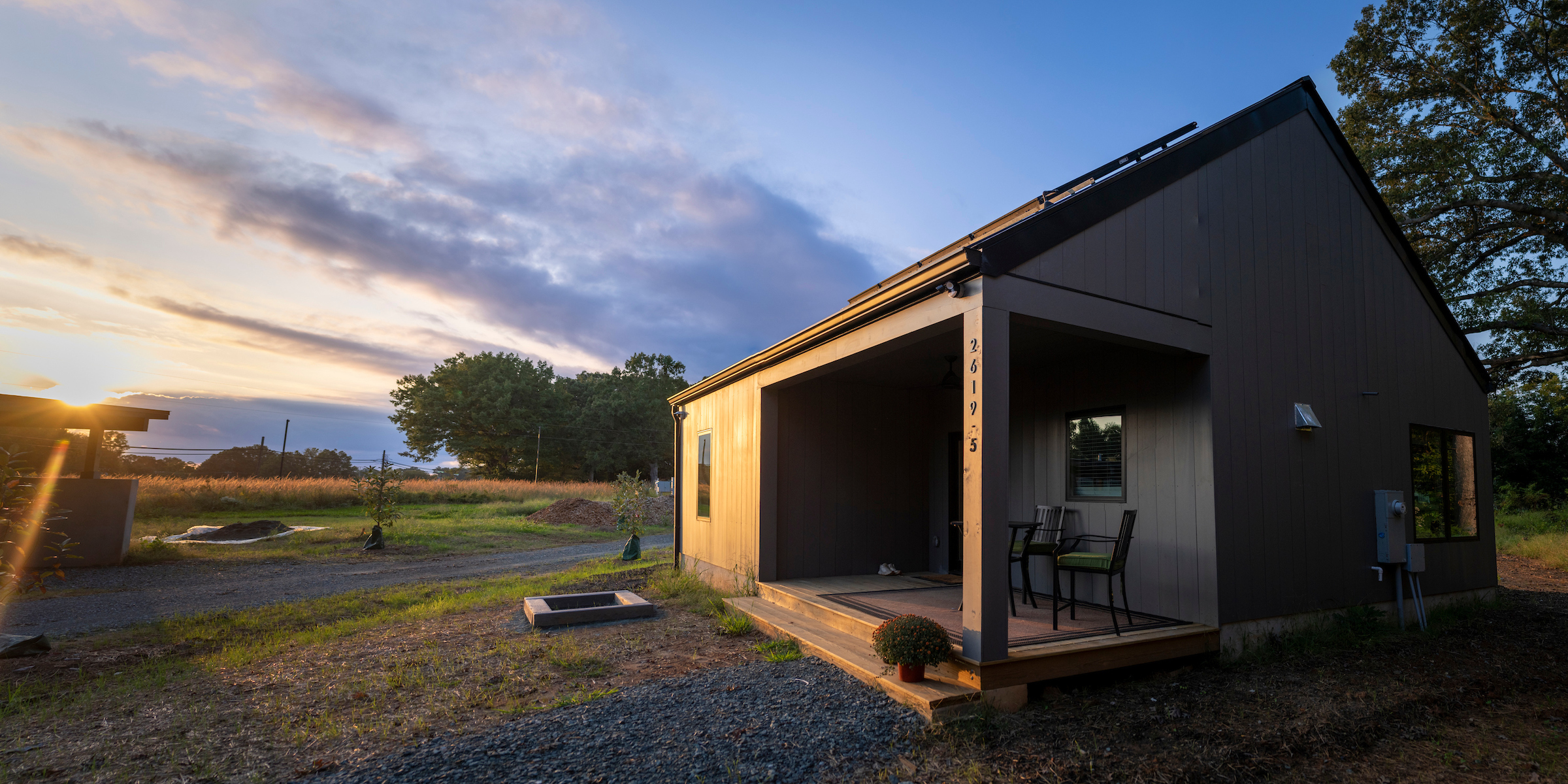Elon’s new EcoVillage Living-Learning Community offers a unique opportunity for students to deeply engage in sustainability practices.
“We are pioneers.”
Ben Shacter ’26 leans on the porch rail of his EcoVillage residence, overlooking Loy Farm and the five neighboring homes in Elon’s latest living-learning community. A gentle fall breeze rustles the oak leaves nearby, a reflection of the natural connection this place embodies.
“We’re all out here doing what we love, and we’re all about making our presence known,” says the environmental studies major from Chicago, referring to his EcoVillage neighbors. “One of the reasons I came to Elon is because it’s so good at providing experience-based learning, and there’s no better learning experience at Elon than this.”
Shacter is one of the first 11 residents of the EcoVillage at Loy Farm, designed as a living laboratory for sustainable living. This year, he and his fellow residents will define the community’s direction, applying classroom learning to real-world activities such as farming and educating others on sustainability, climate and environmental justice.
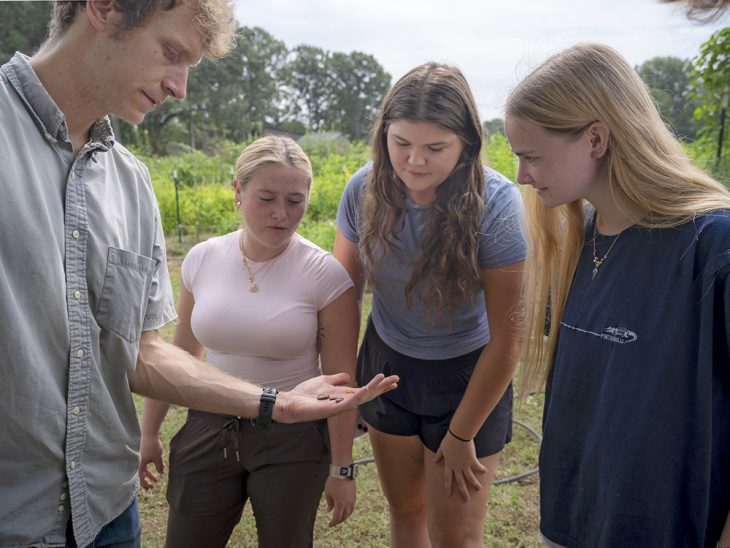
The LLC’s first six homes opened this fall, each around 600 square feet with eco-friendly features such as solar power, green rooftops, stormwater reclamation and earth-sheltering. The mission is to attract students passionate about sustainable living and eager to share that knowledge. With donor support, six more sustainable homes will be built this academic year, enabling a total of 24 students to live in harmony with nature and thrive among new educational opportunities at Loy Farm.
“Having our students live here at Loy Farm is the most direct way to grow their love for the outdoors, develop their tangible skills in agroecology, and to experience that we are part of, not separate from, our environment,” says Jacob Rutz, lecturer in environmental studies and LLC programming coordinator. “I love sharing my passion for sustainable agriculture with Elon students, and I love being at Loy Farm.”
A vision realized
Since 2000, when Elon acquired the farm from the late Bill Loy Jr., faculty envisioned creating a sustainable living and learning hub. The Department of Environmental Studies spearheaded the development of Loy Farm as a working research farm, providing students with hands-on experience with sustainable agriculture.
“This is a vision we’ve been working on for the past 15 years,” says Michael Strickland, director of the Center for Environmental Studies. “We saw the potential to create programs that would impact students and create opportunities that are unusual for universities of our size.”
The farm, managed by Taylor Black, now includes two greenhouses, or “high tunnels,” for year-round harvests, a productive garden plot and areas for experimentation. A small orchard offers opportunities to cultivate now-rare native apple varieties, among other fruits. In 2022 Rutz, an agroecologist focused on applying ecological principles to agriculture, launched the Green Maker Hub to grow native, hybrid and threatened species, such as a blight-resistant chestnut, and train students in advanced grafting and rooting techniques.
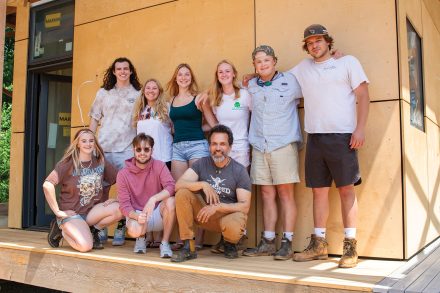
To enhance sustainable architecture studies, Associate Professor of Environmental Studies Robert Charest joined the faculty in 2013 and established a design studio at the farm, further advancing Elon’s commitment to hands-on, sustainable education. Next on the list was to provide a way for students to live at and participate on the farm and in the design-build studio, Strickland says. “This is a dream come true for us.”
More importantly, the project aligns with the Boldly Elon strategic plan, emphasizing sustainability and lifelong environmental responsibility. “The EcoVillage represents an important step forward for Elon and our community, who will visit this hub for education about sustainable practices in architecture and the positive impact each of us can have on the environment when we choose how we live,” President Connie Ledoux Book said at the start of the academic year.
The LLC extends the university’s legacy of sustainable leadership, rooted in its 2007 sustainability master plan and progress toward carbon neutrality by 2037. From energy-efficient projects and LEED-certified
buildings to waste-reduction goals, Elon’s sustainability efforts continue to evolve, thanks to the leadership provided by the Office of Sustainability, which collaborates across campus to advance sustainability in operations and develop educational programming focused on sustainability.
‘From the ground up’
Together with Assistant Visiting Professor of Arts Administration Ashley Hollan, Rutz is originating EcoVillage programming focused on engagement and learning across three themes.
The first, wellness in nature, examines how the natural environment helps people recharge, focus and boost their mental and spiritual well-being. A concentration on lived experience and hands-on skills in nature builds knowledge of organic and sustainable gardening at Loy Farm that students will carry through their lives. A third focus on environmental justice and outreach educates students and the community on recognizing injustice and acting together to correct it.
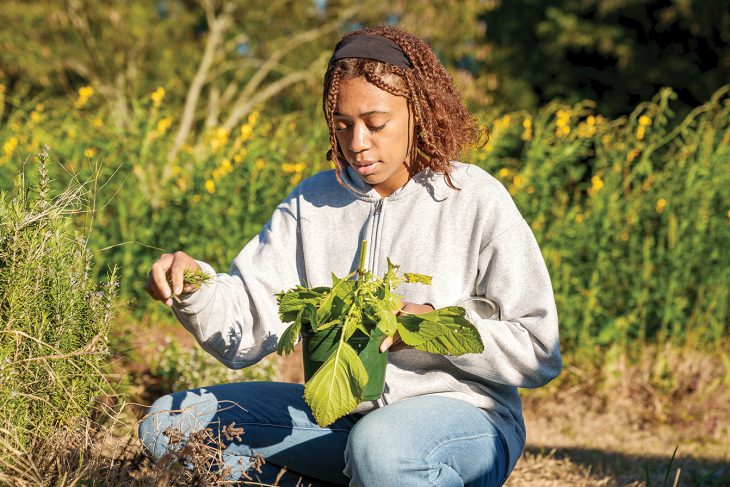
“It’s exciting to see them engage, getting their hands dirty on the farm and learning how to work in collaboration with the land and each other to grow food and healing herbs and maintain the space,” Hollan says. “It is also inspiring to support them as they build a new community from the ground up, navigating the joys and challenges that come with such a trailblazing project.”
That programming is already flourishing. LLC residents self-selected to participate in one of three teams this fall: farming, landscaping, and education and communication.
On several early mornings, Brooks Riley ’27, a member of the landscaping team, accompanied Rutz to install planters at strategic locations among the homes. A history and sociology double major and Elon College Fellow, Riley grew up in an urban area of Chattanooga, Tennessee, without access to a farm. “I’ve already learned a lot of skills in gardening, and those are good practical skills to have,” Riley says. “I’ve always been interested in learning about sustainability and the environment, even if that isn’t my primary focus at Elon.”
“Living here helps me make more connections in environmental studies, with my professors and with other students who are passionate about the same issues and want to learn how to be more sustainable at home and in life.” — Kai Baker ’27
The landscaping crew is establishing small garden plots and decorative areas filled with “beautiful, edible, pollinator-friendly and sustainable” vegetation, Rutz says. Their future work will also improve soil quality and include planting trees and groundcover as cooler temperatures set in later this fall and winter.
By September, the farming team was regularly tending crops at Loy Farm, harvesting tomatoes, peppers and lettuce. In October, they planted fall crops and prepared to sow seeds for winter crops. That produce is shared with Harvest Table Culinary Group, where chefs highlight locally sourced ingredients in Elon Dining menus. Other yields are donated to Elon’s Campus Kitchen, the Alamance Community College Food Pantry, Burlington Housing Authority and the local food bank run by Allied Churches of Alamance County.
A series of workshops Rutz and Hollan are planning for this year will explore environmental justice, racial equity and food justice, inviting the campus community and local farmers to analyze issues and foster solutions. Events will also contribute to designing a master plan for the EcoVillage’s permaculture and landscape development.
Beyond the village
Each resident’s experience embodies the EcoVillage mission: modeling sustainable practices and fostering community, within the village and beyond.
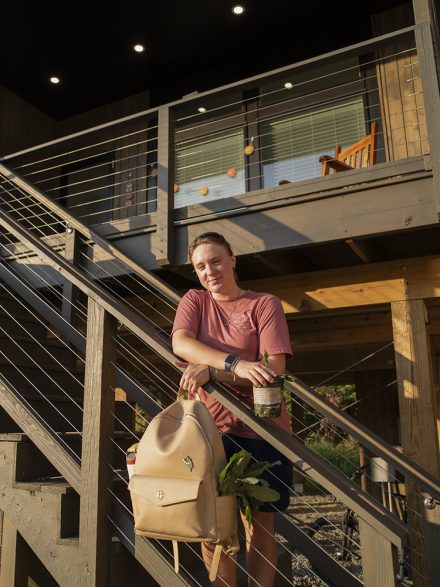
For Kai Baker ’27, an environmental and sustainability studies and outdoor leadership and education double major, the EcoVillage fulfills a personal goal of making a difference in environmental justice. As part of the communications team, he develops social media campaigns to promote educational opportunities in the EcoVillage.
“Living here helps me make more connections in environmental studies, with my professors and with other students who are passionate about the same issues and want to learn how to be more sustainable at home and in life,” Baker says. While the students plan social media strategies, it isn’t lost on them that simply living in the LLC and modeling a more sustainable lifestyle may transmit messages that are more powerful than what’s available through laptops and smartphones.
Each morning, communications team member Caden Halberg ’26 mounts his bike and pedals the short distance to main campus. By doing so, the Elon College Fellow and professional writing and rhetoric major from Wake Forest, North Carolina, hopes to get folks thinking about their collective impact. “Seeing me biking to campus shows people that they don’t have to be dependent on cars to get from place to place.”
Halberg is as interested in growing and defining the EcoVillage community — through public-facing events and connections, as well as regular potluck meals and outings with neighbors — as he is in developing his own skills. “I want to learn to use technology to tell the outside world what we do here and promote the EcoVillage beyond the houses,” he says. “We’re more than that. We’re a community.”
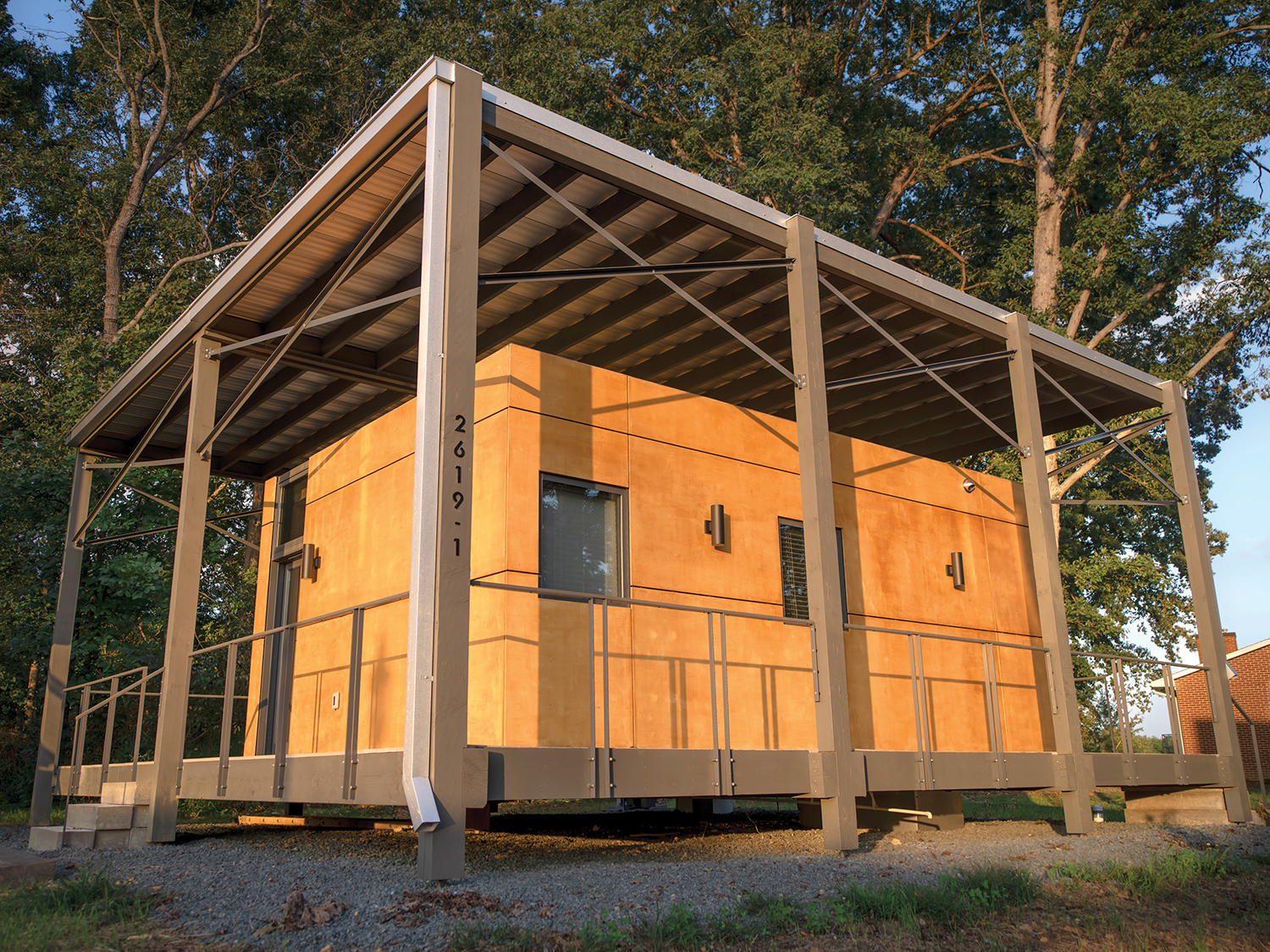
Sidebar: ‘A once-in-a-lifetime opportunity’
Elon students play a role in every aspect of the EcoVillage at Loy Farm — including its construction. Starting in July 2023, over 60 students worked alongside Associate Professor of Environmental Studies Robert Charest as part of his course The Art of Sustainable Architecture to build the community’s first home.
“This was a once-in-a-lifetime opportunity to build a real house in college,” says Kade Iervolino ’24, who remained at Elon after graduation to complete the project and was a peer mentor to others on the build. “We wanted this house to be beautiful and well made. We accomplished that, and now I have a stronger sense of how to manage projects and work in a team while maximizing efficiency and making quality work.”
Their finished design features 500 square feet of interior living space and an additional 500 square feet of exterior spaces, including a wrap-around porch. Raising the house on piers minimized the site impact during construction. A standing seam canopy shades the home to block excess heat and cross ventilation reduces the need for air conditioning.
They completed the project equipped with hands-on experience in design and architecture, carpentry and trades, and — perhaps most importantly — teamwork.
For current resident Ben Shacter ’26, who helped construct House 1 and now lives there, the experience is both practical and personally meaningful. “We learned so much across so many different areas about the details of home construction and human oriented design,” he says, “but what I gained the most were skills in team building, cooperation and communication.”
Meet the team
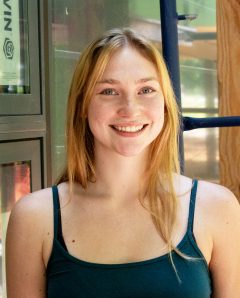
“Every day, I was learning something new and making decisions with high stakes. I had to learn quickly how to adapt to new situations and solve problems, and I think that was a team effort.”
– Genevieve Nichols ’25, environmental studies
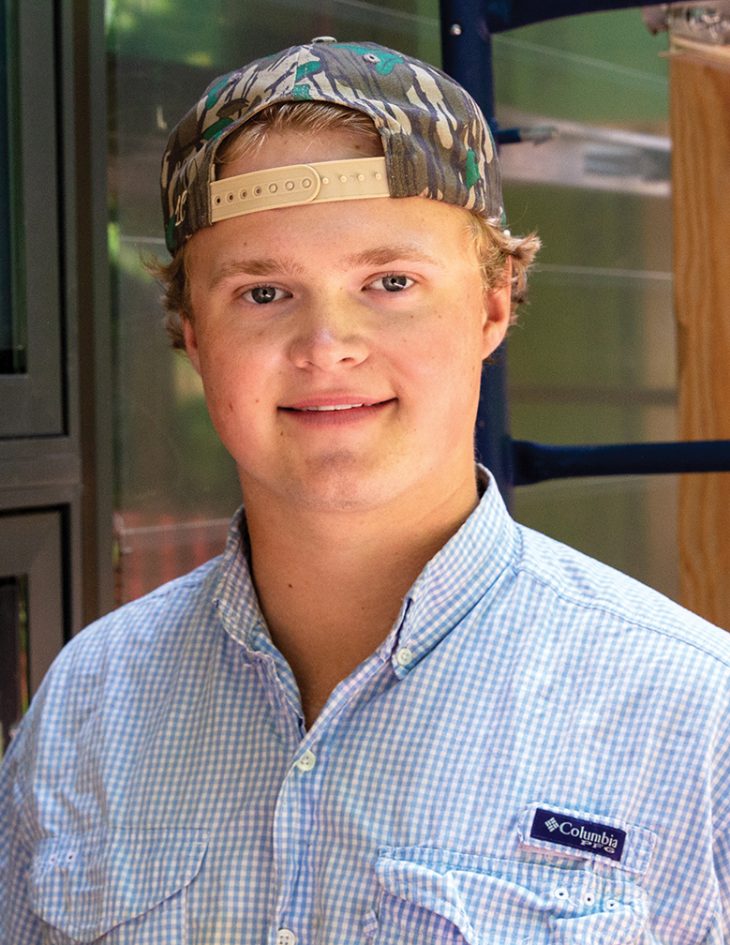
“In addition to sustainable design, construction and trade skills, I learned so much about project management. Managing all the time-sensitive things, from inspections to the weather, the entire process has informed the way I work.”
– Nathaniel Brawley McGee ’24, environmental studies
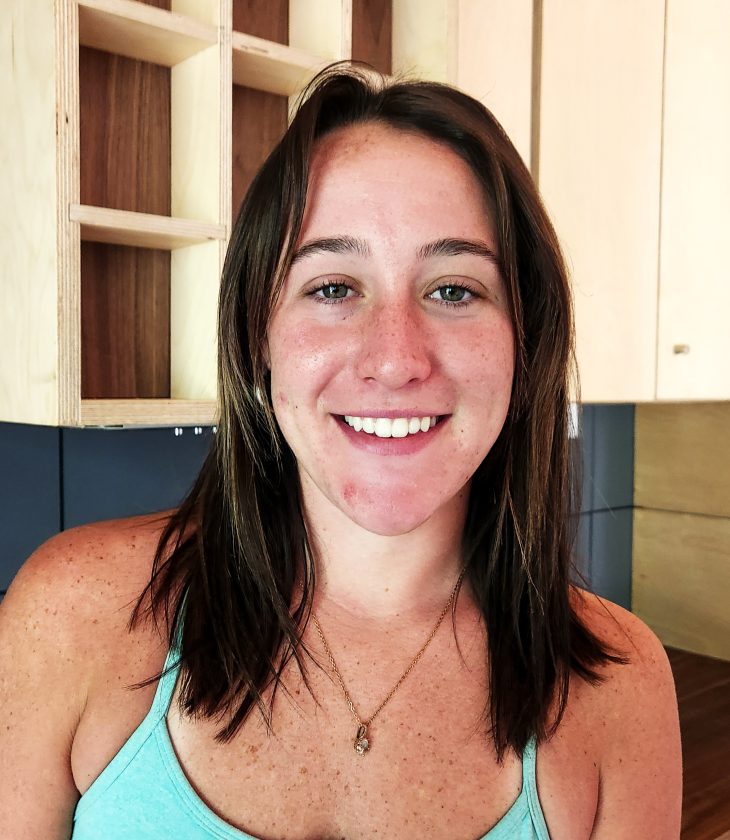
“As a project manager, I wasn’t expecting to love it as much as I did. I’ve become a lot more confident handling tools and trusting myself with measurements. You realize how capable you are.”
– Macey Rodrigues-Cowl ’25, project management and marketing

“We were able to take chances, make mistakes and learn from them. Before, I might have been hard on myself. Now, I can accept them and continue working. That was huge for me.”
– Colin Breuer ’24, environmental and sustainability studies
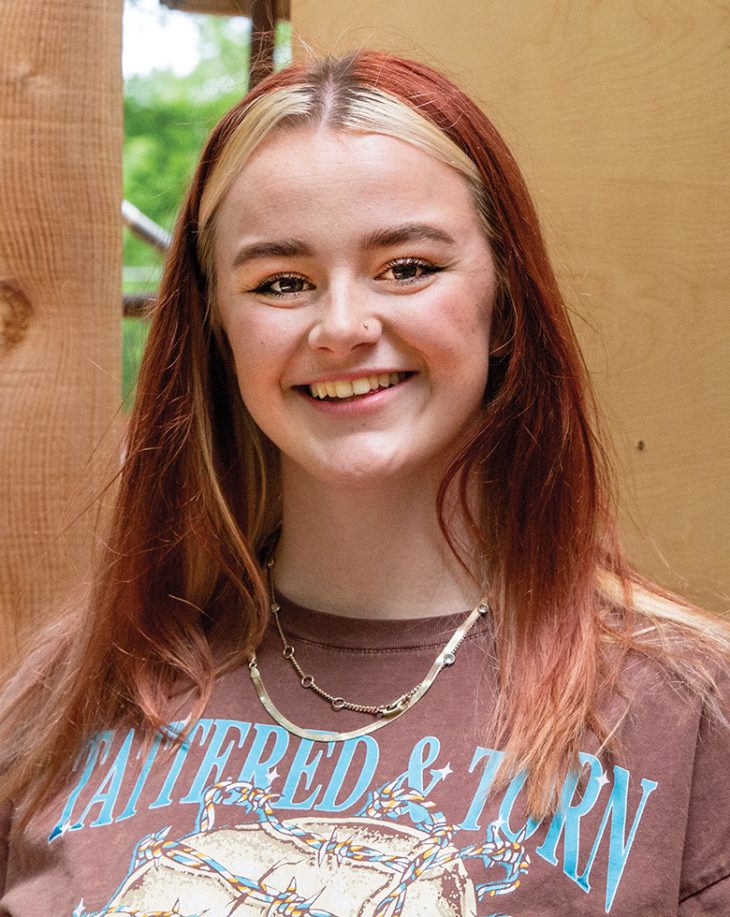
“It was an opportunity I couldn’t pass up, and something I’d never experienced before: building a house, and one that students will live in for decades, while caring for the environment. It’s given me so much confidence.”
– Abi O’Toole ’26, environmental and sustainability studies

“What has been eye-opening for me is how unexpectedly fluid this process has been to result in this level of quality of construction and design. The continuous refining of the design and decision-making on site happened organically and led to beautiful consensus.”
– Robert Charest, associate professor of environmental studies



